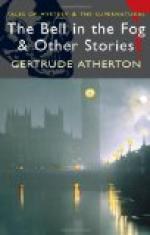She applied the white paint, then the red. She darkened her eyelashes, drew the lip-salve across her pale mouth. She arranged her soft abundant hair in a loose knot. Then she flung off her black frock, selected a magnificent white satin dinner-gown from the wardrobe, and put it on. The square neck was filled with lace, and it hid her skinny throat. She put her feet into French slippers and drew long gloves up to her elbows. Then she regarded herself in the Psyche mirror.
Her eyes glittered. The cosmetics, in the soft pink light, were the tintings of nature and youth. She was almost beautiful.
“That is what I might have been without aid of art had wealth been mine from the moment that care of nature’s gifts was necessary,” she said, addressing her image. “I would not have needed paint for years yet, and when I did I should have known how to use it! I need not have been old and worn at forty-three. Even now—even now—if wealth were mine, and happiness!” She leaned forward, and pressing her finger against the glass, spoke deliberately; there was no passion in her tones: “When that letter came twenty-five years ago offering me a home, I wish I had flouted it, although I did not have five dollars in the world. I wish I had become a harlot—a harlot! do you hear? Nothing—nothing in life can be as bad as life empty, wasted, emotionless, stagnant! I have existed forty-three years in this great, beautiful, multiform world, and I might as well have died at birth for all that it has meant to me. Nature gave me abundantly of her instincts. I could have been a devoted wife, a happy mother, a gay and careless harlot! I would have chosen the first, but failing that—rather the last a thousand times than this! For then I should have had some years of pleasure, excitement, knowledge—”
She turned abruptly and started for the door, stopped, hesitated, then walked slowly to the wardrobe. She unhooked a frock of nun’s veiling and tore out the back breadths. She returned to the mirror and fastened the soft flowing stuff to her head with several of the dead woman’s ornamental pins.
For a few moments longer she gazed at herself, this time silently. Her eyes had the blank look of introspection. Then she went from the house and down to the lake.
The next day the city on the ranchos was able to assure itself comfortably that Webster Lake had had its tragedy.
Of the Tragedy it knew nothing.
VI
The Tragedy of a Snob




